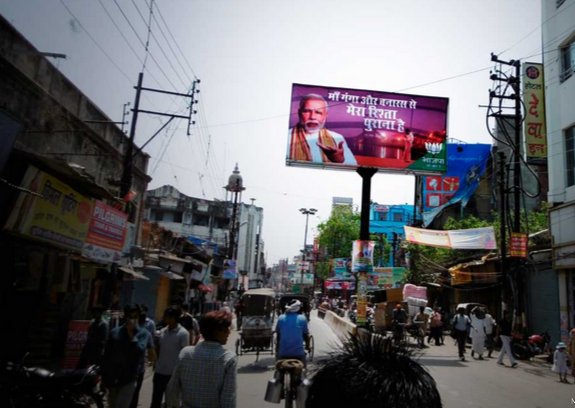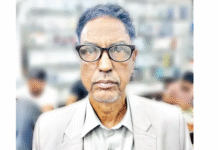History’s largest election ended this week, results are to be released on May 16, and Narendra Modi looks set to win big. His victory will undoubtedly have consequences for U.S.-India relations.
May 12 was Election Day in Varanasi, India, the holy, mystical city on the Ganges River where pilgrims come for bathing and blessing—awaiting the monsoon that will mercifully end May’s dry, dusty heat. Lord Shiva claimed Varanasi as his home in Hindu tradition, and Gautama Buddha preached his first sermon after enlightenment just north of the city. Also called Banaras and Kashi, Varanasi has been continuously inhabited for 4,000 years. “Banaras is older than history, older than tradition, older even than legend,” said Mark Twain, also noting the city, which he visited in 1896, looked twice as old as all of them put together.
Varanasi’s appearance may have not changed much since Twain’s visit, but the city’s political significance has—at least for the 16th Lok Sabha, India’s five-year parliamentary elections. For six weeks, and over nine Election Days, Indian news media outlets have broadcast live from one polling station after another. Narendra Modi, the Hindu nationalist and Gujarati economic miracle worker from the Bharatiya Janata Party (BJP), must win a seat as a member of parliament to be appointed India’s Prime Minister. Although he is running in Vadodara from his home state of Gujarat, Modi is also contesting Varanasi as a demonstration of his patriotism and religious devotion. “Ma Ganga has called me,” said Modi, referring to the sacred river where pilgrims bathe and reverently offer the dead, cremated faithful.
There is no comparable American analogy to this fusion of religion, history, and politics. Imagine a U.S. presidential candidate centering their campaign fortunes in a city that was America’s version of Jamestown, Virginia; Vatican City; and Sumeria combined. Although other candidates oppose Modi in Varanasi—notably Arvind Kejriwal, whose upstart Aam Adami Party’s anti-corruption message resonates with many in India—exit polls indicate the BJP will lead India’s next government and, on May 16, send Modi to New Delhi as Prime Minister.
What will a Modi victory mean for relations between the world’s two largest democracies? Modi has an antagonistic streak, and past calls have arisen from The Economist to Salman Rushdie for his censure. In 2005, the United States denied Modi a diplomatic visa for perceived (though unproven) involvement in Gujarat’s 2002 anti-Muslim riots when he was the state’s chief minister. Former Secretary of State Hillary Clinton embarked on a “get Modi” policy while in office, funding European NGOs on a quest to find mass graves—which never turned up. Although President Obama appears to have quietly reversed the isolation, Modi cannot easily forget being singled out as a Clinton enemy. With Modi as India’s leader, a future Hillary Clinton presidency would present a worst-case scenario for U.S.-India relations.
To his current and future human rights critics, Modi can point to the increased Muslim vote for BJP in 2014, up 6% from 2009 according to exit polls. Additionally, in April 2014, senior Pakistani diplomats expressed preference for Modi for Prime Minister, saying he “could provide the strong leadership necessary for peace talks.” Although no one suggests Modi sees all religions the same—in a Reuters article last year, Modi was quoted comparing a Gujarati Muslim killed in 2002 to a puppy being struck by a car—the votes speak for themselves. To Muslims in both India and Pakistan, Modi may represent the devil they know; a leader whose economic success and reputation for leadership provides stability and confidence. More importantly, given Modi’s Indian nationalism, these voting patterns suggest India’s Muslims who supported the BJP see themselves as Indians first and Muslims second.
The powerful Indian nationalist sentiment Modi has tapped into draws upon allegiances and ties some Americans might find troubling. At a May 8 BJP rally in Varanasi, Modi honored a 115 year old Indian colonel who served under Subhash Chandra Bose in the Indian National Army (INA). Known to most Indians as Netaji, Bose was recognized by the Axis Powers during World War II as India’s rightful government, whose support he sought against the British to help India achieve independence. INA soldiers fought alongside the Japanese against the British in the Burma campaign, were defeated, and 300 officers were tried for treason. In August 1945, Netaji (Bose) died in a plane crash in Japanese-occupied Taiwan.
Outside of India, the INA’s legacy has been mostly forgotten. But within the country—and especially among India’s rising business titans—Netaji is revered. “I believe India would have been a powerful exporter much before China if only Netaji had a front seat in our policy making along with (Jawaharlal) Nehru,” said Infosys Technologies founder Narayana Murthy at Netaji’s 114th birthday celebration. “Netaji was one of the most courageous leaders in India.”
It is the name absent from that list which speaks loudest. Mahatma Gandhi, whom many Americans see as India’s most important founding father, does not command the same respect throughout his country. Although Gandhi’s 1948 assassination inspired national mourning, it was sponsored by the Hindu Mahasabha, the spiritual and political forerunner to the BJP. The conspirators saw killing Gandhi as a necessary evil, believing his policies would destroy India. In the Hindu nationalist view, although Gandhi led a powerful nonviolent resistance movement, he was responsible for giving away Pakistan, setting India on a ruinous economic course, and promoting the country’s cultural division into 22 official languages.
Although Gandhi had few good options for evicting the British and uniting India, Hindu nationalists believe his nonviolence and socialism were fine for spirituality but had no place in statecraft. Ironically, this makes Modi the Mahatma’s antithesis and populist successor. Like Gandhi, Modi’s charismatic patriotism, austere lifestyle and disciplined leadership have won India’s trust. But Modi’s conservative policies run contrary to the socialist Congress, and thus the vote is a clear mandate for change. “He is our Obama,” several Modi voters told me, perhaps unaware of how far off the mark our current president fell from his soaring campaign rhetoric.
No one really knows how Modi will affect India’s international relations, but his hardline conservatism and long memory suggest he will be friendly towards countries who have steadfastly supported India’s independence. Ties to Russia have endured since the Cold War, when India embraced the Soviet Union after the United States supported Pakistan. In 2007, Japanese Prime Minister Shinzo Abe visited Netaji’s memorial in Kolkata, a gesture Modi is unlikely to forget. Relations with China could benefit from India’s economic rise, should India grow as a consumer market, or become strained through geopolitical competition, if skirmishes occurred over the Arunachal Pradesh or Aksai Chin border disputes.
In the Mahabharata, the epic Hindu scriptures, Lord Shiva is depicted as a multi-formed enigma, embodying both honor and brilliance as well as invincibility and terror. Modi supporters treat the 2002 violence—in which they tacitly acknowledge his responsibility—with an Indian equivalent of a Gallic shrug: it was unfortunate, they say, but sometimes good people are forced to do bad things. His opponents respond, correctly, that Modi’s victory repudiates Gandhi’s vision of religious unity, and is thus an Indian tragedy. Shiva has many forms in the Hindu tradition, but the two most dominant are as either a benefactor or a destroyer.
One of every five people—22% of the world’s population—lives in either India or the United States. By 2025, according to current projections, India will overtake China as the world’s most populous country. “They are much the most interesting people in the world—and the nearest to being incomprehensible,” Mark Twain concluded about Indians. “Their character and their history, their customs and their religion, confront you with riddles at every turn—riddles which are a trifle more perplexing after they are explained than they were before.” If Ma Ganga could speak, she could not have better explained the man poised to lead her dynamic and paradoxical nation. Only time—or, perhaps, the sacred river—can tell which of Lord Shiva’s many incarnations the devout Hindu leader will become.










